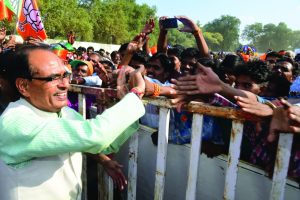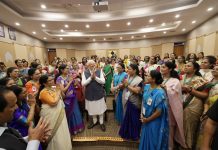 Madhya Pradesh assembly, having 230 constituencies with the tenure of the existing legislative assembly expiring on January 7, 2019, faced the ballot on November 28. The present government led by Bhartiya Janata Party (BJP) under Chief Minister Shivraj Singh Chouhan is striving hard to retain the power for the fourth consecutive time, while the Indian National Congress (INC) is contesting to regain its hold over power it lost in 2003. There are 2,907 candidates in the fray in polls which are being construed as the curtain raiser for the general elections in 2019.
Madhya Pradesh assembly, having 230 constituencies with the tenure of the existing legislative assembly expiring on January 7, 2019, faced the ballot on November 28. The present government led by Bhartiya Janata Party (BJP) under Chief Minister Shivraj Singh Chouhan is striving hard to retain the power for the fourth consecutive time, while the Indian National Congress (INC) is contesting to regain its hold over power it lost in 2003. There are 2,907 candidates in the fray in polls which are being construed as the curtain raiser for the general elections in 2019.
Having fielded candidates in all the 230 constituencies, the BJP is sanguine about winning 200 plus seats and projected the slogan- Abki Baar, 200 paar. On the other hand, 229 seats are being contested by the Congress and the party has allocated one seat to the Sharad Yadav-led Loktantrik Janata Dal (LJD). The number of candidates fielded by the BSP stands at 227 and the SP is contesting for 51 seats. Interestingly, the Aam Aadmi Party (AAP) contesting for the first time has fielded candidates in 208 constituencies. With 70 per cent of total population of Madhya Pradesh engaged in agriculture, the agrarian issues in the wake of increased input costs, limited returns and debt burden of the farmers are going to be the most decisive factor in these polls.
BJP Stakes
Having been in power for three consecutive terms, the BJP has high stakes in retaining power for the fourth term. Decisive mandate is likely to be delivered by the rural population and the Adivasis, especially in Malwa-Nimat region commanding 66 seats and the Jhabua entailing 47 seats. Undoubtedly, the Chauhan government has tried to assuage the feelings of farming community by introducing the Bhavnatar scheme – providing directly to the farmer the gap between the market rate of produce and the Minimum Support Price (MSP); nevertheless, such measures prove instrumental in meeting the agriculture challenge, along with retaining tribal support and the BJP’s ability to convert welfare schemes into political benefitsor not will decide party’s electoral fortune.
This author, who was recently in Madhya Pradesh, prior to the polls, found the tribal people and the farming community in remote rural areas manifesting a mixed mood. The BJP is being looked upon a Hindu-only upper caste party and this can be a challenge for the BJP in such constituencies. Some critics have opined that support of tribal community for the BJP is diminishing compared to 2013. While the BJP insiders, on the one hand, are skeptical about support of the farming community in the wake of an array of crises being faced by the farmers, on the other hand, the party is sanguine about the support of the OBC groups which are the beneficiaries of a mix of welfare concessions.
Sources in the state unit of the BJP privately acknowledge that the party is having a tough time in the upcoming state assembly polls in Madhya Pradesh and justify the reassertion of party’s hard Hindutva stance, which they think may turn the tide in their favour. One expert has opined that perhaps the BJP is contemplating of overriding all the challenges being faced by it with the help of three elements – by playing on memory, arithmetic, and the continued support of the OBCs
According to some critics, the BJP is confronted with anti-incumbency factor, disconnect between the BJP local MLAs and the voters, agrarian crisis, anguish over handling of SC/ST Act, lack of jobs and FDI, and high levels of corruption etc. Despite having launched many welfare schemes and claiming credit for the same, the present incumbent chief minister is campaigning as if ‘his life depends on it.’ However, delivery of these schemes at the ground level, especially in the rural areas, has not been up to the mark. However, the state leadership of the BJP seems to be more sanguine in the wake of PM Modi addressing a smaller number of rallies in Madhya Pradesh as compared to Karnataka and Gujarat.
Congress strategy
The Congress has striven every nerve to unseat the BJP, which is in power in the state for three consecutive terms, with the hope of riding the high anti-incumbency wave propelled by multiple factors. The Congress has focused on harnessing people’s growing disenchantment over the Chauhan government’s failure to create jobs, ameliorate the situation of farmers and provide better law and order. An interesting part of the Congress strategy in Madhya Pradesh has been its projection of ‘soft Hindutva.’ As per media reports, the Congress leadership, both Central and state level, has reportedly frequented religious places — temple, mosque, gurudwara —across MP.
Congress has tried to break into the BJP’s citadel by playing Hindutva card to woo Hindu electorate, customarily seen as the BJP’s vote bank. Promises of building gaushalas (cowsheds) in every gram panchayat, establishing a new adhyatmik vibhag (department for spirituality) and open new Sanskrit schools across the state are also envisaged in the Congress manifesto for MP. Congress’s promise of imposing a ban on RSS shakhas in government buildings in its manifesto has evoked sharp reaction from the BJP, which has alleged that the Congress is displaying deliberate hatred towards the RSS and Hindus. The BJP’s star campaigners have been trying to undercut the Congress party’s subtle message of ‘soft Hindutva’ by questioning Congress president Rahul Gandhi’s Hindu credentials.
Congress slogan of “Badlaav or change” has caught the imagination of a large chunk of the electorate, especially in rural areas of the state. According to some experts, the popular word “badlaav” has come to increasingly define the pre-election mood across districts in the Bundelkhand and Vindhya regions of the state where the common buzzword is that the ruling BJP’s tally looks likely to go down and the Congress’ set to go up. Some analysts of MP politics have attributed this penchant for change to local fatigue after a long spell of BJP’s rule in MP that has been instrumental in spurring disenchantment and fury against the local MLAs, anger among various groups — farmers, small traders, the young — over policy failures, Dalit alienation and the state government’s inability to walk the talk on tall promises and the limited or almost negligible impact of PM Modi’s ‘charisma in these elections.
Opinion Polls
The opinion polls conducted by various agencies over the months present a mixed scenario in which both the BJP and Congress are pitted against one another in a tough electoral battle. The opinion poll conducted on April 4, 2018, by IBC24 had predicted 119 seats for Congress and 101 seats for the BJP. Almost an identical prediction with slight variations was made by ABP News-CVoter in its survey on August 14 this year. A survey by TimesNow-Warroom Strategies on October 9 predicted a big win for the BJP. A survey by News Nation on October 10, showed a neck-to-neck fight between the BJP and Congress. Another survey by ABP News-CVoter on October 17 predicted a majority for Congress, whereas IndiaTV-CNX survey predicted a majority for the BJP. Majority for the Congress was predicted by ABP News-CVoter survey of November 2, as well as survey by Cvoter on November 9. However, ABP News-CSDS survey of November 9, has predicted 116 seats for the BJP and 105 for the Congress. Another survey by Timesnow-CNX, also released on November 9, has given 122 seats for the BJP and 95 seats for the Congress. An average of these surveys predicts a simple majority for the BJP with 114 seats and 106 seats for Congress, thereby reflecting a tough fight between the two national parties.
Way ahead
Ahead of the polls, an interesting aspect of electioneering in Madhya Pradesh was that there was hardly any discussion around a number of important issues that have affected the general populace of the state. Another notable feature was the emphasis on Hindutva by the BJP and Congress. Exchange of jibes and barbs have come to rule the roost in electioneering and it is not a healthy development for a sound democracy. MP is a key state for any party wanting to be in power at the Centre that is why both the BJP and Congress have made it a prestige issue outcome of which will be decided on December 11.
letters@tehelka.com













